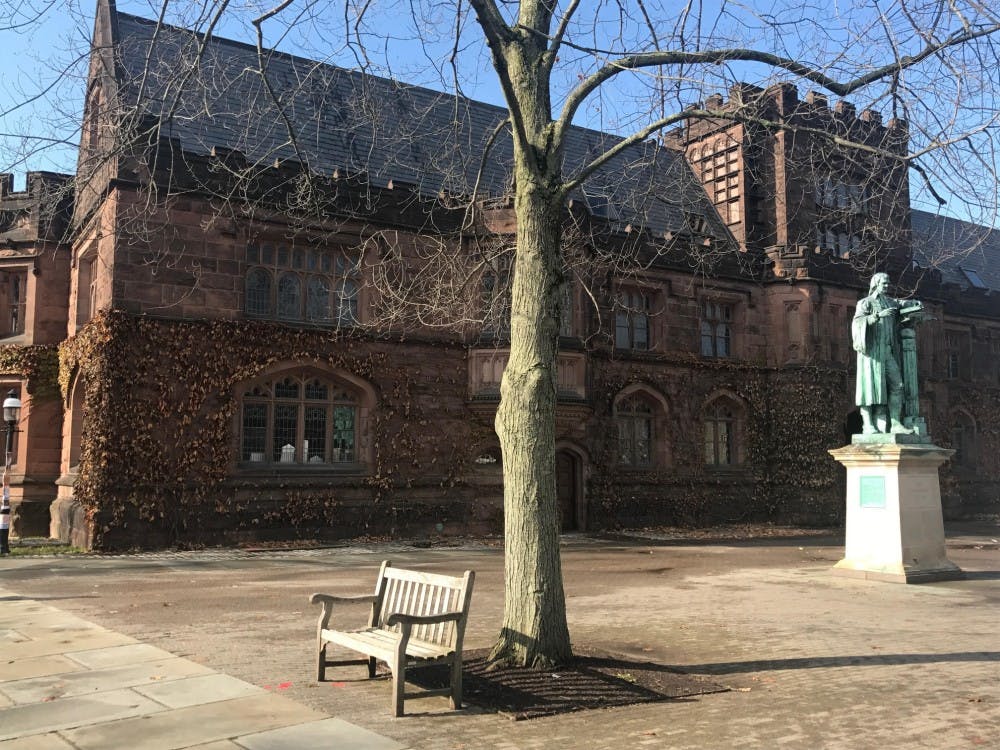Princeton's German Department accepts only about eight students each year to join its new graduate student cohort. These students are among the finest minds in the country, and the very best graduate programs heavily compete for each scholar.
From the outside, the German Department hardly seems the first place to look for gender discrimination. In the graduate school at large, only 38 percent of admitted graduate students in the 2014-2015 academic year were women. However, Director of Graduate Studies Professor Devin Fore wrote in an email, women constitute around half of the German department’s graduate students, above the percentage at the University as a whole.
When they arrive on campus, however, many women find that the department is not quite so equal, according to interviews with 25 current and former students, professors, and administrators in the department.
Several women left the program last year, citing what they perceived as rampant gender-based discrimination. Those interviewed cited a pervasive academic culture that favors men to succeed, but puts obstacles in front of women.
Even a student, not in the department, who told of her initial excitement to take a class in the German department, found herself the center of “demoralizing,” “humiliating,” and “belittling” behavior from the professor – behavior that was overt enough that two other students in the class confirmed it in interviews. While it's not clear that all such instances are gender-based, they indicate a culture that enables such behavior toward many students.
Nearly all of the female students interviewed said the culture of the department had led them to seek therapy.
“We used to joke that the women in our department all went to therapy to deal with the men in our department,” said one former graduate student who was in the department in the 2000s.
Still, those in charge say the department is ultimately a positive environment for women.
“At the University, our department is in some ways a haven [for women], but that doesn’t mean there aren’t residues of this,” explained Professor Michael Jennings of alleged gender-based discrimination in the German Department. As current acting department chair and a former 13-year chair, Jennings expressed a past and present desire for continuous improvement.
Several current and former graduate students interviewed cried as they recounted their experiences and shared documents and recordings with the ‘Prince.’ Many were granted anonymity because they feared retaliation.
“It was a boys’ world and women were just allowed in,” said former graduate student Susan Bernofsky GS '98. Other former graduate students said they knew women who previously left the department citing gender-based discrimination.
Many current and former graduate students, some of whom came forward independently and others who were contacted by the ‘Prince,’ felt that their experiences were validated after the ‘Prince’ published an account of an allegedly discriminatory German Department. Others even posted Facebook statuses detailing their experiences. These students often cited asymmetrical power relationships between students and faculty as part of the foundation of alleged gender-based discrimination and abuse. While not every professor was accused of alleged discrimination in interviews, students alleged that a “culture of permissiveness” pervaded the department even among faculty who weren’t active perpetrators.


After the 'Prince' published its first story about women's experiences in Princeton's German Department, some women posted on Facebook about their experience. Susan Bernofsky, who was a graduate student in the 1990s, was one of them.
“Historically and still, women don’t have the same amount of power in the [a graduate] department and even when they do they’re led to believe they don’t,” said K.A. Amienne, speaking broadly about graduate departments. Amienne serves as a consultant who helps academics with their research and writing, especially women recovering from bullying, conflict, and abuse in academia. Among faculty, women often struggle to reach the pinnacle of academic success: tenured full professorship. In this, the German department at the University is hardly unique, as professors from other schools confirm.
‘You’d never think it would happen here’
Princeton’s German Department is known for some of the most progressive graduate classes in media theory and philosophy at the University. Many of its graduate students identify as progressive, and a few are even Marxists. Its undergraduates are treated to individualized attention and department-sponsored trips to Europe. Even its list of readings for graduate general exams, called an erudition list, includes several liberal authors.
Students interviewed for this article often characterize the department as progressive from the outside, especially in its intellectual teachings. Faculty connections allow students opportunities throughout the academic world that can’t be quantified. Nearly every former graduate student acknowledged the department’s prestige; several said that the Princeton name was extremely instrumental in helping them get a job. Beyond reputation, the numbers speak for themselves: the department has the best job placement rate in the country for men and women, a distinction it’s had for nearly a decade.
Acting chair Jennings said Princeton and a few other universities compete for the best graduate students in the country. To convince them to attend the University, he tells them four things: the department is progressive and keeps “on the edge of the scholarly wave,” it is more critical than others and produces “real intellectuals,” it is serious about professionalizing its graduate students, and it has one of the best teaching instructors in the country, senior lecturer Jamie Rankin.
“You’d never think it would happen here,” said one student about the department’s alleged gender-based discrimination. But there were, and still are, whispers. Even though the course listings appear progressive, students attest to discriminatory behavior inside the classroom – and that behavior isn’t limited to male faculty, they said. Although Title IX reports provided to the 'Prince' were used only in the investigation previously reported on, the accounts also detailed instances of abuse from other professors. For example, one account alleges that female professor told a female student to “not come up with fancy terms,” to “not talk in lectures,” and to “go home and read, lock yourself in a room and read until you’re smarter.”
The department faculty consists of 15 tenure and tenure-track professors, five of whom are women. Of those five, two are visiting professors. One woman, Inka Mülder-Bach, is a permanent visiting professor and a full professor, meaning that while she is only on campus one of three semesters, she performs all of the same advising functions full time as another professor in the department. Of the 10 male faculty members, three are full professors, and none of these men are visiting or permanent visiting professors. Jennings said that among the most competitive graduate programs, Princeton’s German department was “decidedly mediocre” on gender balance, but it’s something they seek to improve.
One former graduate student said that he never personally felt any discrimination, even as an openly gay man. He acknowledged, however, that his identity as a white man may have protected him. He added that the department was actually “pretty inclusive” and his relationship with faculty and advisors was healthy. Some faculty members were even at his wedding.
“German has a reputation for being extremely rigorous especially at some place like Princeton,” he explained. “That’s why I opted into the Princeton department. It’s a tough department.” Several people interviewed who have been in German studies departments at other public and private universities noted this sentiment. But they said that such challenges might be different for women, something Jennings acknowledged.
“Graduate school is, in general, a harder assignment for women,” said Jennings, adding that he believes “we live in a misogynistic society.”
In interviews, students often linked conduct to the department’s academic focus, which graduate students characterized as heavily male-focused and white. The supposedly progressive erudition list was called “too male” and “too white.”
A sample Erudition List, used to study for general exams, for the German Department, which was criticized by graduate students for being "too male" and "too white."
Female graduate students described situations in seminar where they felt as if they were expected to be well-versed in the female authors for the class – and that they were supposed to educate the class on these female authors instead of just requiring the class to read the book. Besides classroom discrimination, students expressed disillusionment with a culture that heavily favored men who “could do no wrong.”
“There was the ‘Golden Children [Boys]’ phenomenon: men were getting it right but somehow what we were doing wasn’t right,” said one former graduate student of her experience. The term ‘Golden Boys’, one that came up in multiple interviews, refers to students who conformed to the department’s male-centered focus, intellectually and in some cases, even culturally.
Yet, students said they struggle to reconcile this dichotomy of the German Department: one view that is intellectually progressive and academically distinguished versus one that is known for gender-based discrimination.
Moreover, undergraduates expressed admiration for a department that uses its small size to pay extra attention to them. The same professors criticized by graduate students were praised by undergraduates for their conduct and individualized attention to departmental concentrators.
One undergraduate student said that her choice to major in German was the “best decision” she’s made at the University.
“I would do it again,” she said. “I don’t want people to miss out on the opportunities this department provides undergraduates.”
However, even some undergraduates sometimes notice hostility toward women that’s more familiar to graduate students. One undergraduate, for example, alleged that he saw a female classmate get “berated” by a male professor in front of the class.
“It’s men with prejudice who are being asked to police other men who have done these things and they don’t care so it’s just a cycle of people who are not caring,” said another undergraduate student.
‘Free me from this Ivy disappointment’
The department’s reputation for gender-based discrimination does not begin with the graduate students who called for reform in the faculty-student town hall in 2017 that the 'Prince' has reported on. Rather, it began not long after women faculty members and graduate students first filled the University’s Gothic structures at the start of coeducation.
“As for sexual harassment, I only heard the usual gossip,” wrote Ruth Klüger in correspondence with the ‘Prince.’ Klüger, who taught in the department from 1980 to 1986, wrote to the ‘Prince’ that the department was not friendly to women and hardly equitable. Klüger, now a professor emerita at the University of California, Irvine, wrote that her experiences at Princeton eventually made her implore her former colleagues to take her back – to “just free me [her] from this Ivy disappointment.”
Acting chair Jennings, who has been in the department a decade more than any other faculty member, can attest to the department’s trajectory in its treatment of women, and acknowledged its heavily male atmosphere in the ’80s and ’90s.
“My experience had nothing to do [with] sexual misdeeds, but there was a pervading contempt for women and a clear resentment that we didn’t anymore occupy our previous subordinate positions,” Klüger wrote. As the first full female professor in and eventual chair of the German department, she wrote that even when in such positions, she had “reason to believe that grad[uate] students were discouraged to work with me.”

A view of carvings on East Pyne Hall, home to the German Studies Department at the University.
New York University professor Avital Ronell GS ’79 alluded to similar gender discrimination during her time in the department in her book “Fighting Theory.” She noted that she carried “wounded memories of graduate school” and that she was “probably the only woman in this department who was not completely self-effacing and intimidated," pointing to an environment that was not easy for most women to work in. In an email, Ronell declined to comment for this article.
Such lore from decades ago is well-known. In interviews, several women explained that their advisors had passed these stories down. One graduate student said she had learned of Ronell’s book from another student who told her that the book helped her “get through her time” in the department.
These testimonies illustrate the department’s long history with alleged discrimination, which continues to the present day. Three women have left the department in the past year, the ‘Prince’ previously reported. All three said in previous interviews that gender discrimination affecting their work and research was critical to their decision to leave the department.
Current and former graduate students, in the department, at Princeton, and even outside the University community, have alleged a classroom and departmental culture that prefers men. Women spoke of being cut off in the middle of their presentations after only minutes, while male graduate students were allowed to go on for an hour or more. Others noted that they never felt welcome to speak up in seminar, and were castigated or made to feel ignorant in front of their peers if they did.
“It took me a few sessions to realize that, because I’m also male, but I realized the female students don’t speak and if they did, it was made out to be ridiculous,” said one former graduate student in another department. “The male graduate students saw what was going on,” he added, “but there was nobody trying to intervene.”
Bernofsky, who now works at Columbia University, spoke of a biased environment during her time as a graduate student at Princeton from 1990 to 1998. She alleges faculty didn’t see women as serious scholars. At departmental gatherings, she said, professors spoke to male students about academic and intellectual topics while making only small talk with female graduate students – a practice that continues today, other interviewees said. One graduate student described a conversation where a professor referred to her as “Salome,” a Biblical woman recognized for her erotic dancing. Another graduate student said she was hugged from behind by a male faculty member at a departmental event, according to her written Title IX account, as previously reported by the ‘Prince.’
“It was just like being in the boys’ locker room . . . and the girls were lucky to be there,” Bernofsky said, adding that when she was recruited, there was this pervasive sense that the faculty “took male students to be more serious.” The departmental environment was part of a culture where “the history of harassment” was prominent, she said.
“The vast majority of women who experienced inappropriate treatment never pushed back against it for fear of professional harm,” Bernofsky said.
Female graduate students first banded together to discuss their concerns in the 2000s. They met with faculty and then with the department’s director of graduate studies. Much as in the spring 2017 town hall, requests focused on clarity for departmental requirements and expectations for research and teaching. Without understanding the standards, female students alleged that they were frequently bullied for not meeting benchmarks.
“If you just say ‘I was sexually harassed’ then you kind of throw in the towel on reform,” said a graduate student who helped plan the first town hall. “We would have never dared include the discrimination piece.”
Other former and current graduate student women in the department said that sexual harassment was an “open secret.” While more than five people interviewed for this article alleged that there are or have been one or two more Title IX cases in the German Department in addition to the one previously reported, the ‘Prince’ cannot confirm the existence of these allegations. Furthermore, due to the nature of Title IX confidentiality, the University would not confirm or deny these allegations.
‘You feel like you’re crazy’
Women now, and in decades past, describe trying to articulate their frustrations in the department. One woman who went to the Sexual Harassment/Assault Advising, Resources, and Education (SHARE) office during the 2000s recounted an experience that left her no recourse.
“I met with a woman who said, ‘What you’re describing, we can’t really do anything about’ and explained what the consequences would be if I wanted to pursue something,” said the former graduate student.
“I don’t think I even knew there was a Title IX office,” said another former graduate of her time during the 2000s.
Female and male graduate students said that they often saw classroom gender-based discrimination, and even noticed it at departmental events or in advisor-advisee relationships, but rarely knew how to address it.

Signs directing towards departmental offices inside East Pyne; most University departments, like German, are small.
“It’s just like coming out of an abusive family and you just realized it was abusive and you thought it was your fault it was abusive,” said another graduate of the program. Several women described struggling to articulate just what about their experiences was so different from that of men in the department.
“As a woman, I think you feel like you’re crazy in a way, because so much of it is the perception of the effect that’s going on between you and this person but, ultimately, you just feel a certain sexual interest that’s very difficult to say exactly,” said one former student.
If students recognized sexual harassment, they didn’t know where to turn. And, according to the most recent WeSpeak survey conducted by the University, many graduate students do experience such harassment. Eight percent of graduate women indicated that they experienced sexual harassment during the 2016-17 academic year, and of that number, 23 percent said that harassment “involved an employee/staff member, faculty member, or postdoc.”
The survey, administered during the past three academic years to measure sexual misconduct and awareness on campus, indicated graduate students are less sure where to turn than undergraduates in cases of sexual misconduct and graduate women are much less likely to report cases of sexual misconduct than undergraduate women.
“I think female graduate students are subtly, insidiously silenced in the department,” said a former graduate student.
Several graduate students in other departments, such as Spanish and Portuguese, Comparative Literature, and the School of Architecture, who have taken classes in the German department said in interviews that they are not inclined to do so again.
The student who felt “belittled” in a graduate seminar by the professor’s behavior said that by the end of the semester, nearly everyone in the class had noticed her alleged mistreatment. Two other students in the same class corroborated this story in interviews with the ‘Prince.’
“It really broke me,” she said. “I was very, very humiliated and kind of blindsided by the narrative I’d constructed for myself to cope in the class.” She said that her experience in the class exacerbated her struggles with mental health.
This student’s experience was hardly singular, based on interviews with current and former graduate students. Women in the department shared similar stories of struggles with mental health while at the University in the 2000s.
“We were all in therapy and all talking about how we felt like we didn’t belong here and that that feeling was reinforced by a lot of the behaviors and these classroom settings,” said a former graduate student.
“I’m very pro-therapy, but the gender split was pretty striking on that,” said another former graduate student.
‘These are our careers’
Women, in expressing their concerns about their time in the German department, frequently cried during interviews. They told stories of friends leaving for other departments, other graduate schools, or announcing that they would never again enter academe upon graduation.
“When people focus just on sexual harassment, they forget that the ship actually sinks because of the stuff beneath the water. Sexual harassment is just the tip of the iceberg,” one graduate student explained.
Even the subtlest discrimination, another woman said, could manifest itself glaringly in their research and academic work.
One graduate student said that departmental teaching expectations for women seemed to be higher than that for men, keeping women from their research. While a man was relieved of teaching duties because “he needed to work on his dissertation,” a pregnant woman who needed to work on her dissertation was required to teach, said a former graduate student.
“There’s a lack of acknowledgement that women also need time to write,” she said. “Virginia Woolf wrote 'A Room Of One’s Own' and that’s just it: You need a room and you need the f**king time and you’re less likely to get it if you’re a woman in the department.”

Light shines through the stained glass windows inside the main lobby of East Pyne Hall, home to many language departments.
This systemic problem doesn’t seem to be confined just to the University; Bernofsky said that the department’s problem of gender disparity was one found in German studies broadly. Now at Columbia, she said Columbia’s German department tenured and tenure-track faculty are also majority male.
And while at Johns Hopkins University, Bernofsky said she walked into the restroom to see an older female faculty member comforting a tearful younger female faculty member. Her advice to the younger faculty member: “just grin and bear it.”
Princeton's department, Jennings said in an interview, wants to address the concerns brought up by this article.
“If a significant number of people experienced that [gender-based discrimination], then it should be and is a concern for the department,” he said. “Why they would experience it, or the specific mechanisms that led to that, I don’t know. It’s very hard to get a handle on it.”
Jennings was previously chair from 1999 to 2012, and said that during his time he sought to address such gender parity concerns.
“As long as I’ve been a department officer … the department never tolerated gender discrimination,” he said. “I can assure you that if acts of gender discrimination were reported, we would have taken it very seriously.”
During Jennings’ chairmanship, the department hired Brigid Doherty with tenure and promoted Sally Poor from assistant professor to associate professor with tenure.
“The trajectory in the department since 2000, while never uniform, is toward gender equity,” Jennings said.
At some universities, language departments have been merged into one modern languages department. Some students interviewed told the ‘Prince’ that they feared this outcome for German Studies, even those who alleged that their time in the department was filled with discrimination.
“The idea that these offenses [in the department] would drive a bastion of this type of humanities research under is very painful to me,” a former graduate student said.
Princeton’s department is tiny, and so is the discipline itself. Jobs in German studies are hard to come by, but having a department with a high ranking, prestige, and renowned scholarship helps graduate students find work.
“There are really good things the German Department has done – good advising, good scholarships – that’s why I joined the department,” said one student. “And yet, there’s also this very real discrimination and I’ve seen it.”
If you have more information regarding the issues raised in this article or similar ones, please email marciagbrown19@gmail.com. We will not use your name in a story without your permission.
If you would like to speak to a confidential resource, please call SHARE at 609-258-3310.





